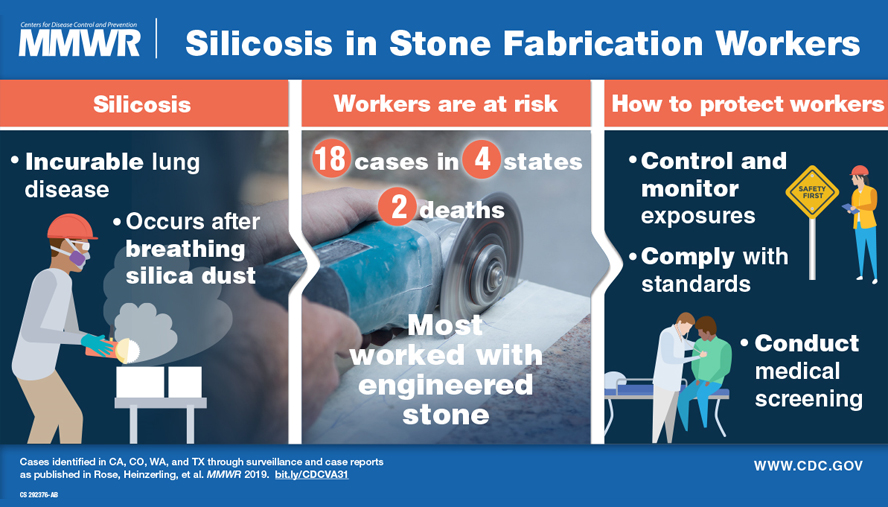Severe Silicosis Found Among Fabricators of Engineered Quartz Stone
Eighteen Cases Discovered in Four States Suggest Much Wider Problem
Denver, CO —
Engineered stone, made of ground quartz and resin, has become a tremendously popular material for kitchen countertops due to its durability, low maintenance and customizable colors and patterns. Workers who form, shape, cut and polish the material, however, appear to be at significant risk of severe and potentially deadly lung disease. In this week’s Morbidity and Mortality Weekly Report, researchers from California, Colorado, Texas and Washington report 18 cases of severe silicosis, and two fatalities, among young, mostly Hispanic men, who worked at engineered stone fabrication plants.

Image courtesy of U.S. Centers for Disease Control and Prevention.
“Engineered stone contains a much higher silica content than does natural stone, posing significant risk to those who handle and work with the material,” said Cecile Rose, MD, MPH, professor of medicine at National Jewish Health and co-author of the study. “We believe there may be hundreds, if not thousands of cases of silicosis among workers in the engineered stone industry.”
Silicosis is an incurable lung disease caused by inhaling particles of crystalline silica. The particles trigger inflammation and scarring in the lungs, leading to progressive, irreversible and potentially disabling and fatal disease. Silicosis patients are at higher risk for autoimmune diseases and lung infections, especially tuberculosis. Engineered stone has a very high silica content, greater than 90 percent, compared to less than 45 percent in granite.
After sensing a rise in silicosis cases among her patients, Dr. Rose reviewed patient files and discovered seven recent cases of silicosis among engineered stone workers in her Colorado practice alone. Public health officials in California, Washington and Texas identified 11 more cases through various surveillance programs. Two of the California cases were fatalities discovered in follow-up investigations of one fabrication plant. Several of the patients with silicosis also had autoimmune diseases, such as rheumatoid arthritis and scleroderma. Two had latent tuberculosis infection.
In 2018, the stone fabrication industry employed an estimated 96,000 employees in 8,700 mostly small fabrication plants in the United States. In Australia, screening of workers in the stone fabrication industry found about 12 percent of the workers had developed silicosis. Comparable rates of silicosis in the U.S. would mean that 11,500 workers in the industry could have silicosis. Small stone fabrication companies face challenges protecting workers due to limited awareness and cost of exposure control technologies.
“We urgently need to identify stone fabrication workers at risk and reduce their exposure to silica dust,” said Amy Heinzerling, MD, MPH, co-author of the MMWR report and Epidemic Intelligence Service Officer, Centers for Disease Control and Prevention/California Department of Public Health. “Employers, public health authorities and health care providers must all work together to address this emerging silicosis threat in the stone fabrication industry.”
The National Jewish Health Center of Excellence for Silicosis and Its Prevention offers diagnosis and treatment of silicosis as well as surveillance and exposure reduction consultations for employers in industries with potential silica exposure. For more information call 303.270.2609 or 877.255.5864.
National Jewish Health is the leading respiratory hospital in the nation. Founded in 1899 as a nonprofit hospital, National Jewish Health today is the only facility in the world dedicated exclusively to groundbreaking medical research and treatment of children and adults with respiratory, cardiac, immune, and related disorders. Patients and families come to National Jewish Health from around the world to receive cutting-edge, comprehensive, coordinated care. To learn more, visit the media resources page.
Media Resources
We have many faculty members, from bench scientists to clinicians, who can speak on almost any aspect of respiratory, immune, cardiac and gastrointestinal disease as well as lung cancer and basic immunology.
Media Contacts
Our team is available to arrange interviews, discuss events and story ideas.
- Adam Dormuth
303.398.1002 office
970.222.5034 mobile
dormutha@njhealth.org - Jessica Berry
303.398.1082 office
303.807.9491 mobile
berryj@njhealth.org
